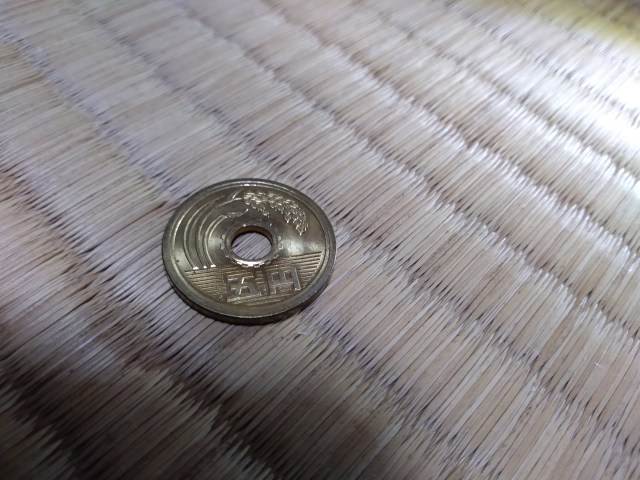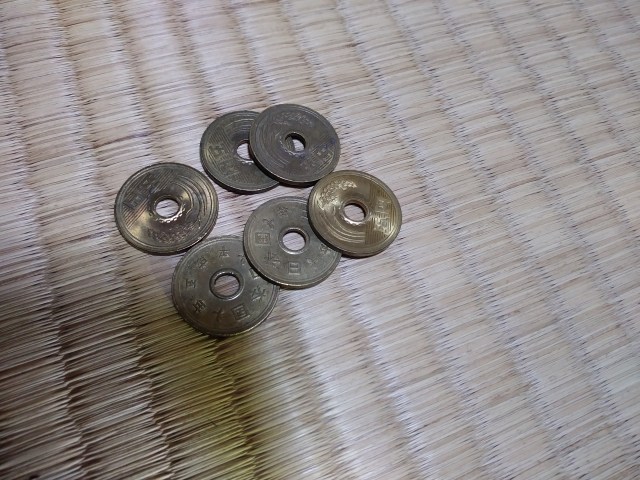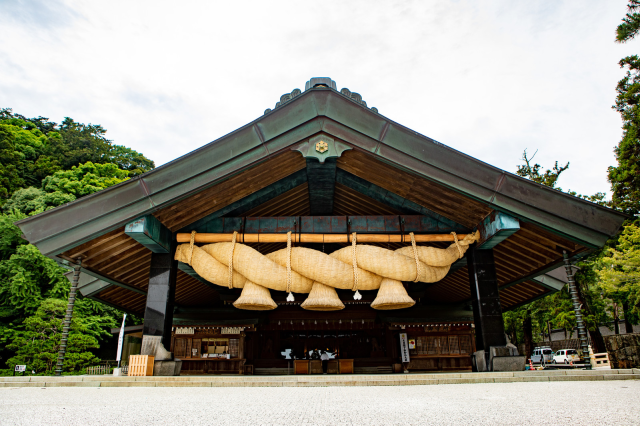
You may have heard giving a certain amount of money will win you favor with the gods, but a very high authority says otherwise.
When visiting a Shinto shrine or Buddhist temple in Japan, it’s customary to toss some coins into an offering box that’s positioned in front of the altar before saying a short prayer. If you ask most Japanese people, they’ll tell you that the best offering to make is one of just five yen (4.6 US cents).
This isn’t because of any societal value of humility or enlightened detachment from material possessions, however. It’s because the way you say “five yen” in Japanese, go en, sounds just like goen, the Japanese word for “auspicious connection” or “good fortune.”
▼ Five-yen coins
Since most of the prayers said at places of worship in Japan contain some sort of wish for divine help finding romance, passing school entrance exams, achieving economic success, or maintaining physical health, the logic is that offering five yen will give you a little push from the gods towards your ambitions. There are also some alternative lines of thinking, which recommend offering:
● 25 yen (nijugo en: Sounds like niju goen, “doubly good fortune.”
● 45 yen (shijugo en): Sounds like shiju goen, “constant good fortune”
● 500 yen: The largest coin (kouka in Japanese), which presumably should also have the largest effect (also kouka)
But while you’ll hear that these are numerological keys to a happy future from lots of people in Japan, you won’t hear that from the priests at Izumo Taisha.
▼ Izumo Taisha
Izumo Taisha is widely considered the oldest Shinto shrine in Japan, plus is the site where Japan’s millions of gods are said to gather each fall. Despite a history that stretches back over a thousand years, though, Izumo Taisha is also modern enough to have an official website, and listed in its FAQ question you’ll find:
Q: Is there a certain amount of money visitors are supposed to offer?
A: We sometimes hear tour guides say that offering five yen ensures good fortune, or that you should offer 25, 45, or 500 yen [for the reasons discussed above], in order to make a fun or funny story. This has no spiritual basis whatsoever, and their advice is nothing more than puns for entertainment.
What is important is to convey your sincere thoughts and feelings to the gods through your prayer, and to hold on to those feelings in your daily life. A heart filled with prayer is not one to be controlled by amounts of money or strange wordplay.
So there you have it: Izumo Taisha itself says that the amount of money you offer is the least important part of your visit to the shrine, in a distant third beyond piety and a genuine commitment to being a good person.
That said, Japan has long had something of a playful attitude about religion, with secular reasons for visiting shrines and temples, such as an interest in history, architecture, and local cuisine being as big of a draw for modern travelers as spiritual concerns. Since, as Izumo Taisha says, there’s no set amount you’re supposed to give, there’s nothing wrong with tossing a five-yen coin into the collection box if it puts a smile on your face, a spring in your step, and a new Japanese vocabulary word in your head. Just don’t expect that specific donation to act as a cheat code that unlocks all of life’s hidden bonuses to your luck stat.
Source: Izumo Taisha official website via Twitter/@hen_manner via Jin
Izumo Taisha image: Pakutaso
All other photos ©SoraNews24
● Want to hear about SoraNews24’s latest articles as soon as they’re published? Follow us on Facebook and Twitter!
Follow Casey on Twitter, where he still hasn’t spent the five-yen coin he had left over from his very first trip to Japan.



 Izumo’s Starbucks, a stone’s throw away from the gathering place of Shinto’s eight million gods
Izumo’s Starbucks, a stone’s throw away from the gathering place of Shinto’s eight million gods Does Japan’s five-yen coin need a foreigner-friendly redesign?
Does Japan’s five-yen coin need a foreigner-friendly redesign? TripAdvisor Japan announces the country’s 10 favorite shrines and temples
TripAdvisor Japan announces the country’s 10 favorite shrines and temples Five amazing Japanese Starbucks locations that let you keep sightseeing as you take a break
Five amazing Japanese Starbucks locations that let you keep sightseeing as you take a break This amazing suit of samurai armor is made of five-yen coins, and you can make your own too【Pics】
This amazing suit of samurai armor is made of five-yen coins, and you can make your own too【Pics】 How to order snacks on a Shinkansen bullet train in Japan
How to order snacks on a Shinkansen bullet train in Japan New Nintendo Lego kit is a beautiful piece of moving pixel art of Mario and Yoshi【Photos】
New Nintendo Lego kit is a beautiful piece of moving pixel art of Mario and Yoshi【Photos】 Demon Slayer: Kimetsu no Yaiba gets new roller coaster attractions and food at Universal Studios Japan
Demon Slayer: Kimetsu no Yaiba gets new roller coaster attractions and food at Universal Studios Japan New samurai glasses are Japan’s latest weird must-have souvenir
New samurai glasses are Japan’s latest weird must-have souvenir Finally! Nintendo Japan expands Switch 8-bit controller sales to everybody, Online member or not
Finally! Nintendo Japan expands Switch 8-bit controller sales to everybody, Online member or not Apartment in Japan explodes following bizarre series of events【Video】
Apartment in Japan explodes following bizarre series of events【Video】 McDonald’s adds a new Cheese Bacon Potato Pie to its menu in Japan for a limited time
McDonald’s adds a new Cheese Bacon Potato Pie to its menu in Japan for a limited time Nintendo history you can feel – Super NES, N64, and GameCube controllers become capsule toys
Nintendo history you can feel – Super NES, N64, and GameCube controllers become capsule toys Tokyo Station’s perfect breakfast spot might just be this izakaya Japanese-style pub
Tokyo Station’s perfect breakfast spot might just be this izakaya Japanese-style pub High-fashion Totoro cuddle purse is like an elegant stroll in the forest【Photos】
High-fashion Totoro cuddle purse is like an elegant stroll in the forest【Photos】 Hello, cosmetics! Clinique teams up with Hello Kitty this summer for first-time collaboration
Hello, cosmetics! Clinique teams up with Hello Kitty this summer for first-time collaboration “The most Delicious Cup Noodle in history” – Japan’s French Cup Noodle wins our heart【Taste test】
“The most Delicious Cup Noodle in history” – Japan’s French Cup Noodle wins our heart【Taste test】 Starbucks releases a cute Frappuccino and Unicorn Cake…but not in Japan
Starbucks releases a cute Frappuccino and Unicorn Cake…but not in Japan Kyoto Tower mascot termination reveals dark side behind cute Japanese characters
Kyoto Tower mascot termination reveals dark side behind cute Japanese characters McDonald’s Japan’s Soft Twist Tower: A phantom ice cream only sold at select branches
McDonald’s Japan’s Soft Twist Tower: A phantom ice cream only sold at select branches Yabai Ramen: What makes this Japanese ramen so dangerous?
Yabai Ramen: What makes this Japanese ramen so dangerous? Japanese government wants to build luxury resorts in all national parks for foreign tourists
Japanese government wants to build luxury resorts in all national parks for foreign tourists To combat declining birth rate, Japan to begin offering “Breeding Visas” to foreigners
To combat declining birth rate, Japan to begin offering “Breeding Visas” to foreigners 10 things you should buy at 7-Eleven in Japan
10 things you should buy at 7-Eleven in Japan Studio Ghibli releases anime heroine cosplay dresses that are super comfy to wear
Studio Ghibli releases anime heroine cosplay dresses that are super comfy to wear Woman charged for driving suitcase without a license in Osaka
Woman charged for driving suitcase without a license in Osaka Studio Ghibli unveils My Neighbour Totoro miniature house model
Studio Ghibli unveils My Neighbour Totoro miniature house model Kyoto experiencing problems with foreign tourists not paying for bus fares, but not on purpose
Kyoto experiencing problems with foreign tourists not paying for bus fares, but not on purpose Fighting mild hunger with a Japanese soda that turns into jelly in the stomach【Taste test】
Fighting mild hunger with a Japanese soda that turns into jelly in the stomach【Taste test】 Studio Ghibli’s Howl’s Moving Castle tapestry unveiled in Japan for first time
Studio Ghibli’s Howl’s Moving Castle tapestry unveiled in Japan for first time McDonald’s new Happy Meals offer up cute and practical Sanrio lifestyle goods
McDonald’s new Happy Meals offer up cute and practical Sanrio lifestyle goods Sales of Japan’s most convenient train ticket/shopping payment cards suspended indefinitely
Sales of Japan’s most convenient train ticket/shopping payment cards suspended indefinitely Sold-out Studio Ghibli desktop humidifiers are back so Totoro can help you through the dry season
Sold-out Studio Ghibli desktop humidifiers are back so Totoro can help you through the dry season Japanese government to make first change to romanization spelling rules since the 1950s
Japanese government to make first change to romanization spelling rules since the 1950s Foreigner’s request for help in Tokyo makes us sad for the state of society
Foreigner’s request for help in Tokyo makes us sad for the state of society Ghibli founders Toshio Suzuki and Hayao Miyazaki contribute to Japanese whisky Totoro label design
Ghibli founders Toshio Suzuki and Hayao Miyazaki contribute to Japanese whisky Totoro label design Doraemon found buried at sea as scene from 1993 anime becomes real life【Photos】
Doraemon found buried at sea as scene from 1993 anime becomes real life【Photos】 Tokyo’s most famous Starbucks is closed
Tokyo’s most famous Starbucks is closed Princesses, fruits, and blacksmiths: Study reveals the 30 most unusual family names in Japan
Princesses, fruits, and blacksmiths: Study reveals the 30 most unusual family names in Japan Japan’s new eight-headed dragon license plates might be the coolest in the entire world【Pics】
Japan’s new eight-headed dragon license plates might be the coolest in the entire world【Pics】 Japan Airlines staff reassigned to work as shrine maidens during coronavirus travel downturn
Japan Airlines staff reassigned to work as shrine maidens during coronavirus travel downturn New hair pins let you look like you’ve been stabbed in the head with a classic Japanese icon
New hair pins let you look like you’ve been stabbed in the head with a classic Japanese icon Say “thank you” to the Heisei era with a can of Hesei air
Say “thank you” to the Heisei era with a can of Hesei air Foxy kitsune socks will have you looking Shinto-chic
Foxy kitsune socks will have you looking Shinto-chic Tokyo’s sushi spirit shrine, where the souls of seafood slumber
Tokyo’s sushi spirit shrine, where the souls of seafood slumber Flush your prayers down the toilet at this unique Japanese temple
Flush your prayers down the toilet at this unique Japanese temple Nara unveils new vending machines that sell deer crackers
Nara unveils new vending machines that sell deer crackers What’s the minimum amount of money Japanese women want their husbands to earn? Survey investigates
What’s the minimum amount of money Japanese women want their husbands to earn? Survey investigates Prefectural rivalry in Japan: Survey reveals which areas compete against each other, and why
Prefectural rivalry in Japan: Survey reveals which areas compete against each other, and why Aichi man arrested for failing to steal very large donation box from Shinto shrine
Aichi man arrested for failing to steal very large donation box from Shinto shrine Quiz time! How many of these photos of Japanese places can you identify?【Photos】
Quiz time! How many of these photos of Japanese places can you identify?【Photos】 Divine prevention – Japan using Shinto symbols to combat litter and public peeing
Divine prevention – Japan using Shinto symbols to combat litter and public peeing Why buy your cat a cat house when you can buy a cat shrine from Japan instead?
Why buy your cat a cat house when you can buy a cat shrine from Japan instead?
Leave a Reply